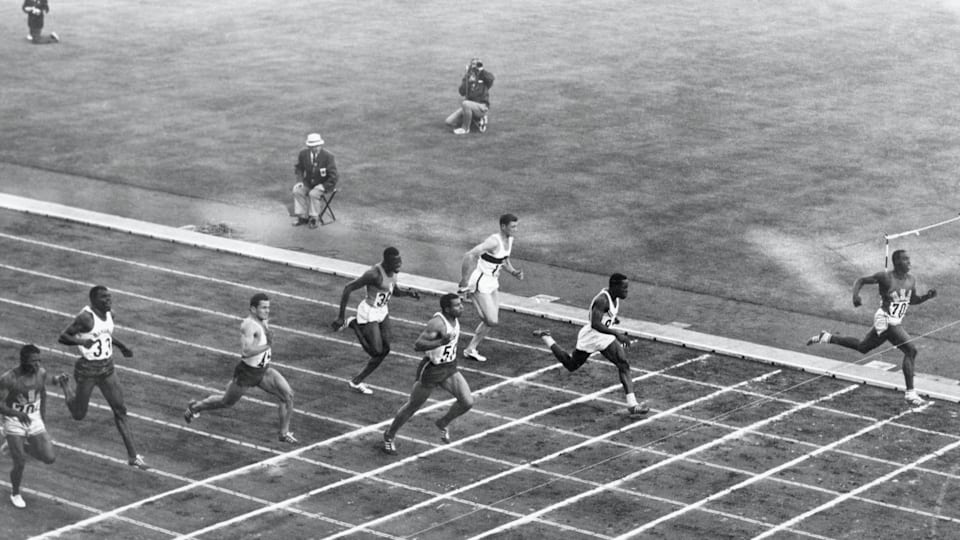Melvin Pender: The sprinter who was carted off on a stretcher - but never gave up
In October 1964, Tokyo hosted their first Olympic Games. To celebrate, Tokyo 2020 will bring you some of the most incredible and historic moments that took place 56 years ago. In the latest part of the series, we take a look at Melvin Pender, the sprinter who wanted desperately to finish the 100m final.

Background
Melvin Pender had no idea about track running until the age of 25 — several years before his debut at the Olympic Games Tokyo 1964.
Born in the U.S. state of Georgia in 1937, Pender grew up dreaming about joining the military. In 1960, he was sent to the American army base in Okinawa, Japan, serving in the 82nd Airborne Division. There his speed was noticed during an Army Ranger football game. One day, he was asked to participate in a friendly athletics competition between the American military and Japanese athletes training for Tokyo 1964.
In his autobiography, Expression of Hope – The Mel Pender Story, he recalled his reaction to the request.
“'Coach, what are you talking about? Run track?' I asked. 'I never ran track in my life! I wouldn’t know the first thing to do?' I continued.”
He was also not a fan of track shoes, noting that they were “ugly, ugly, ugly”.
With all that said, he won the very first race. Later he was asked to compete in several inner-service competitions, where he won the 100 and 200 yards, before eventually being sent to train for the Olympics.
Pender did have a personal reason to want to compete at Tokyo 1964 — Japan held a special place in his heart.
Growing up as an African American in the segregated South of the USA, Pender encountered discrimination in both his home state of Georgia and in the army. Yet in Japan, he finally felt the acceptance and equality that he had been longing for.
“It was a completely different world to any previous experience I had gone through. The people were hard-working, intelligent, and very polite. This was the first time a group of people had shown me so much respect,” he wrote in his biography.
The moment
Pender was to compete in the 100m and 4×100m relay at Tokyo 1964.
Tying for first in his 100m heat then finishing second in his quarter-final, Pender joined USA teammate, then 100m favourite Bob 'the Bullet' Hayes in the semi-final. Up until that point, he had run with relative ease but Pender tumbled on the cinder track after barely qualifying for the final.
According to Hayes, Pender was carted off on a stretcher.
Later it was discovered that Pender had torn muscles around his rib cage — before the semi-final, he was messing around with fellow teammate Trent Jackson, who punched him in the stomach and caused internal bleeding.
He was given injections to kill the pain and was advised not to run in the final. But he couldn't face the idea of giving up when he was only one race away from triumph.
So there he was, standing in lane eight.
As the starting pistol was fired, Pender drove out the blocks, but the pain weighed down on him.
“I was in front of Jerome (Harry Jerome of Canada) and Figuerola (Enrique Figuerola of Cuba) at about the 70 metres mark when the pain got so bad that I lost stride and didn’t know if I could make it to the finish line,” he recalled.
In an immense show of determination, Pender finished sixth. Hayes, who won the gold medal, praised Pender, saying “he showed fantastic courage just by running with the pain he had."
After the race, Pender was sent to hospital and could not participate in the 4×100m relay.
In a US Military newspaper published days after the final, Pender was quoted as saying: “I promised my wife and daughter I’d bring them home a gold medal. If there would have been more time between the semi-finals and the finals of the 100, I think I could have won it.”
What happened next
After Tokyo 1964, Pender returned to the military. He graduated from Officer Candidate School in 1965 and was deployed to Vietnam. However, five months later he was sent back to the U.S. to train for the 1968 Olympics in Mexico City.
At the age of 31, Pender travelled to Mexico City for a second chance at Olympic glory. Although he again finished sixth in the 100m, he won gold in 4×100m relay with Charlie Greene, Ronnie Ray and Jim Hines. Together they set a new world record of 38.24 seconds.
During his career, Pender also set world records at the now-obsolete distances of 50, 60 and 70 yards.
Off the track, Pender returned to Vietnam and earned a Bronze Star. Later he served as the assistant head track coach at West Point. Although he had trained for the 1972 Olympics, age was against him and the 34-year-old failed to make his third Olympic team.
After retiring from the military, Pender opened a sporting goods store in Atlanta and helped design models for an athletic shoe company. He constructed the first swimming pool for African Americans in his hometown of Lynwood Park, Georgia and coordinated several track and field clinics.
Despite the ups and downs on and off the track, Pender wrote a message of hope in his memoir: “What one person does, rightly, or wrongly, will have an impact on the lives of many, and working to achieve success is possible, regardless of your life situation.”
